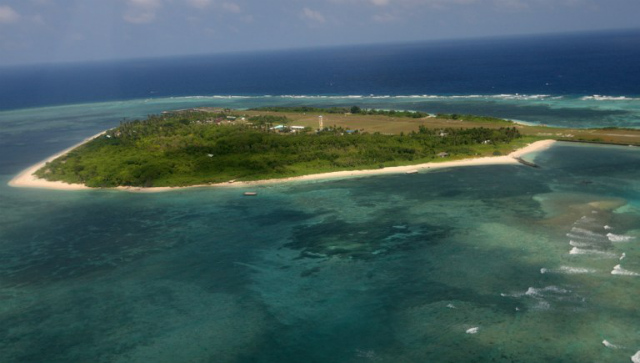From Rappler (Jan 13): Taiwan hits China fishing law, dismisses PH claim
![DISPUTED ISLANDS. An aerial photo shows Pag-asa (Thitu) Island, part of the disputed Spratly group of islands, in the South China Sea located off the coast of western Philippines on July 20, 2011. File photo by Rolex dela Peña/Pool/AFP DISPUTED ISLANDS. An aerial photo shows Pag-asa (Thitu) Island, part of the disputed Spratly group of islands, in the South China Sea located off the coast of western Philippines on July 20, 2011. File photo by Rolex dela Peña/Pool/AFP]()
Like thePhilippines , Taiwan rejected China Manila 's claim over the disputed South China Sea .
Taiwan , which calls itself the Republic of China (ROC), stood firm in claiming the Spratly Islands 3 days after the Philippines China
In a statement by the Taipei Economic and Cultural Office in thePhilippines , Taiwan said the Spratly Islands (Nansha Islands ), Paracel Islands (Shisha Islands ), Macclesfield Islands (Chungsha Islands ), and Pratas Islands (Tungsha Islands
The claim covers all “their surrounding waters and respective seabed and subsoil.” This is based on “the perspectives of history, geography, and international law.”
“Therefore, the ROC government reasserts that it enjoys all rights over the islands and their surrounding waters, and thus its official and private vessels should also enjoy freedom of navigation and operation in the said waters. Furthermore, it cannot accept any claim of sovereignty over, occupation, or legitimate regulation of these areas by other countries or territories,”Taiwan
ThePhilippines , on the other hand, asserted its claim over the Spratlys as well as other portions of the sea, which it calls the West Philippine Sea . It filed a historic case against China
Joint exploration
In its statement,Taiwan also urged countries “bordering the islands,” such as the Philippines South China Sea .”
In place of unilateral measures,Taiwan South China Sea .”
“The ROC government also urges the countries bordering the South China Sea to exercise self-constraint so that peaceful resolutions toSouth China Sea disputes can be reached through consultation and dialogue. The ROC government remains willing to participate in dialogue aiming to form resolutions to disputes and promote regional peace, stability, and freedom of navigation,” Taiwan
ThePhilippines , for its part, said it has requested China
“We are gravely concerned by this new regulation that would require foreign fishing vessels to obtain approval from Chinese regional authorities before fishing or surveying in a large portion of the South China Sea,” the Philippines' Department of Foreign Affairs (DFA) said in a statement Friday, January 10.
“This development escalates tensions, unnecessarily complicates the situation in theSouth China Sea , and threatens the peace and stability of the region,” the DFA added.
http://www.rappler.com/nation/47870-taiwan-china-fisheries-law-philippines

DISPUTED ISLANDS . An aerial photo shows Pag-asa (Thitu) Island, part of the disputed Spratly group of islands, in the South China Sea located off the coast of western Philippines
Like the
In a statement by the Taipei Economic and Cultural Office in the
The claim covers all “their surrounding waters and respective seabed and subsoil.” This is based on “the perspectives of history, geography, and international law.”
“Therefore, the ROC government reasserts that it enjoys all rights over the islands and their surrounding waters, and thus its official and private vessels should also enjoy freedom of navigation and operation in the said waters. Furthermore, it cannot accept any claim of sovereignty over, occupation, or legitimate regulation of these areas by other countries or territories,”
The
Joint exploration
In its statement,
In place of unilateral measures,
“The ROC government also urges the countries bordering the South China Sea to exercise self-constraint so that peaceful resolutions to
The
“We are gravely concerned by this new regulation that would require foreign fishing vessels to obtain approval from Chinese regional authorities before fishing or surveying in a large portion of the South China Sea,” the Philippines' Department of Foreign Affairs (DFA) said in a statement Friday, January 10.
“This development escalates tensions, unnecessarily complicates the situation in the
http://www.rappler.com/nation/47870-taiwan-china-fisheries-law-philippines